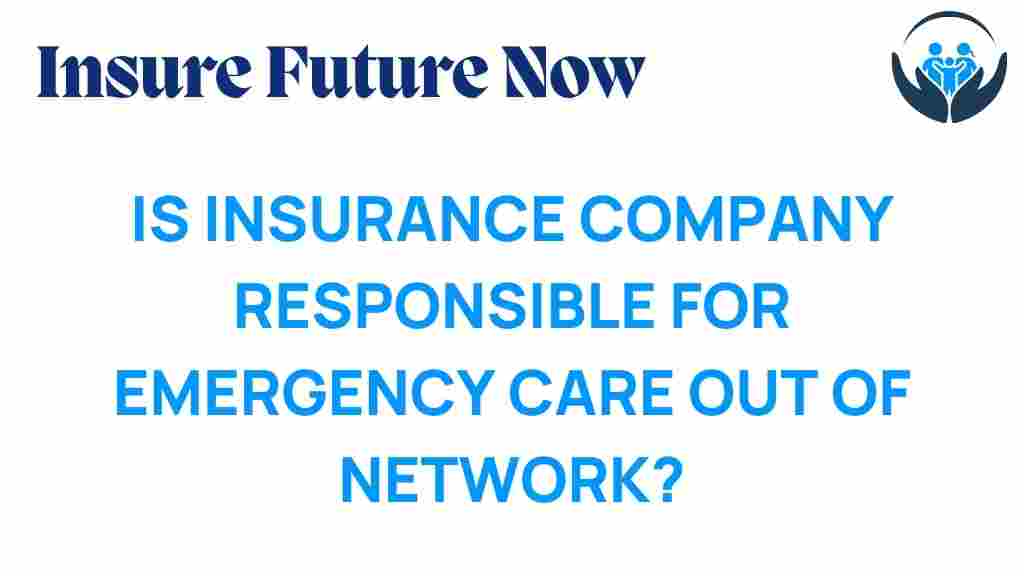Is Your Insurance Company Liable for Out-of-Network Emergency Care?
When faced with a medical emergency, the last thing on your mind is likely to be whether the healthcare provider is in-network or out-of-network. In fact, many patients find themselves in a situation where they need immediate care from a provider that their health plan does not recognize as part of its network. This raises an important question: Is your insurance company liable for out-of-network emergency care? In this article, we will explore the complexities of insurance coverage, patient rights, and the potential costs associated with seeking emergency care from out-of-network providers.
Understanding Emergency Care and Insurance Coverage
Emergency care refers to medical services that are provided to treat urgent and life-threatening conditions. These services can include, but are not limited to, hospital visits, surgeries, and urgent care interventions. Insurance coverage for emergency care can vary significantly depending on your health plan and whether the provider is in-network or out-of-network.
Here are key points to consider regarding emergency care and insurance:
- Most health plans are required by law to cover emergency services, regardless of whether the provider is in-network or out-of-network.
- However, the extent of coverage and the costs associated with out-of-network care can differ widely between insurance plans.
- Patients should be aware of their rights and understand how their specific health plan handles emergency care.
Patient Rights in Emergency Situations
Patients have certain rights when it comes to receiving emergency care. Understanding these rights can help you navigate potential disputes with your insurance provider:
- Right to Emergency Care: Under the Emergency Medical Treatment and Labor Act (EMTALA), hospitals are required to provide emergency care to all patients, regardless of their insurance status or ability to pay.
- Right to Fair Coverage: Insurance companies cannot deny coverage for emergency services based on the provider’s network status.
- Right to Appeal: If your insurance claim for emergency care is denied, you have the right to appeal the decision.
How Insurance Plans Handle Out-of-Network Emergency Care
When you receive emergency care from an out-of-network provider, the way your insurance handles the costs can depend on several factors:
- Deductibles and Copayments: Many plans require higher deductibles and copayments for out-of-network services. This means you may need to pay more out-of-pocket compared to in-network care.
- Balance Billing: If your out-of-network provider charges more than what your insurance is willing to pay, you may be responsible for the difference. This is known as balance billing.
- Negotiated Rates: Some insurance plans negotiate rates with out-of-network providers. If your plan has such arrangements, you may pay less than the billed amount.
Step-by-Step Process for Handling Out-of-Network Emergency Care
If you find yourself receiving out-of-network emergency care, here’s a step-by-step process to ensure you are protected and understand your rights:
- Seek Immediate Care: Your first priority should always be your health. Seek care at the nearest emergency facility.
- Document Everything: Keep a record of all medical services received and any communications with healthcare providers.
- Contact Your Insurance Provider: After receiving care, notify your insurance company about the emergency services you received. Inquire about coverage and any potential costs.
- Submit Claims: If your insurance does not automatically process the claim, you may need to submit it manually. Include all relevant documentation.
- Review the Explanation of Benefits (EOB): Once your claim is processed, review the EOB carefully to understand the coverage and any out-of-pocket costs.
- Appeal if Necessary: If your claim is denied or you disagree with the coverage amount, you have the right to appeal the decision.
Understanding Costs Associated with Out-of-Network Emergency Care
The costs associated with out-of-network emergency care can be significant. Here are some factors that can influence these costs:
- Facility Fees: Hospitals often charge facility fees, which can be higher for out-of-network services.
- Specialist Fees: If you require care from specialists, they may also charge higher rates if they are out-of-network.
- Insurance Plan Terms: Review your health plan documents to understand the specific terms related to out-of-network emergency care.
Troubleshooting Tips for Out-of-Network Emergency Care Claims
If you encounter issues with your out-of-network emergency care claims, consider the following troubleshooting tips:
- Contact Provider’s Billing Office: Sometimes, the provider can offer assistance in navigating insurance claims and resolving billing issues.
- Contact Your State’s Insurance Department: If you feel your insurance company is not honoring your rights, reach out to your state’s insurance regulatory body for assistance.
- Consult a Healthcare Advocate: Healthcare advocates can help you understand your rights, negotiate costs, and navigate the insurance claims process.
Conclusion: Know Your Rights and Coverage Options
In conclusion, while your insurance company is generally liable for out-of-network emergency care, the specifics of coverage can vary significantly based on your health plan. It is essential to understand your patient rights, the potential costs involved, and how to navigate the claims process effectively. Always prioritize your health by seeking immediate care, and follow up with your insurance provider to ensure you receive the coverage you deserve.
Stay informed and prepared to advocate for your rights as a patient. For further reading on healthcare rights and insurance issues, check out this comprehensive guide on understanding your health insurance.
By being proactive and knowledgeable, you can better manage the complexities that come with out-of-network emergency care and ensure that you do not face unexpected financial burdens.
This article is in the category Claims and created by InsureFutureNow Team
